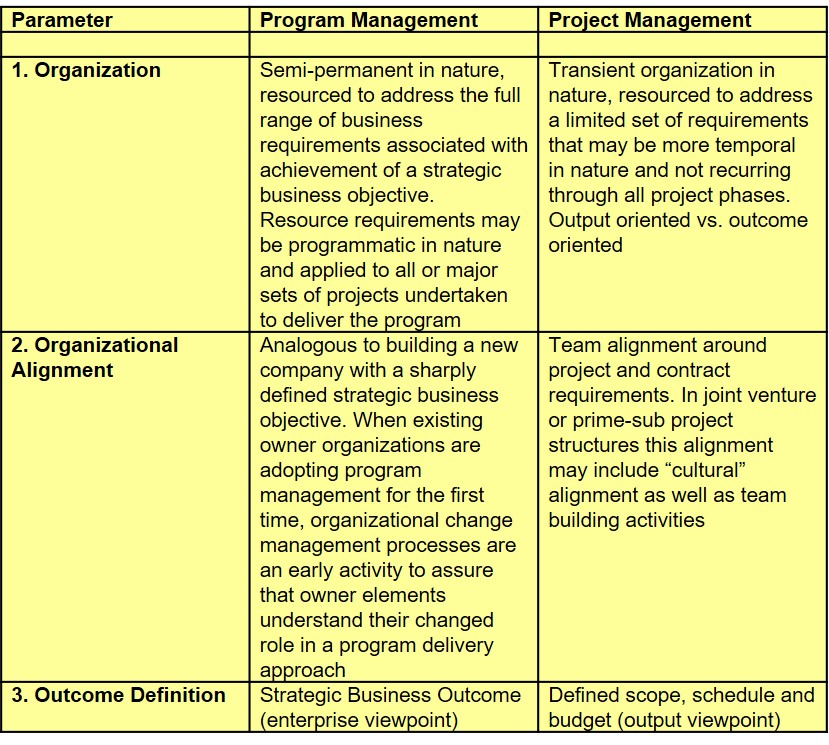in Program Management
SECOND EDITION
By Bob Prieto
Chairman & CEO
Strategic Program Management LLC
Jupiter, Florida, USA
The delivery of complex capital programs worldwide is increasingly challenged by the depth and breadth of management skills required for successful program execution. Capital programs today continue to grow in scale and complexity; face growing human and critical material resource constraints; require global resources or as a minimum compete for them; and are increasingly sensitive to successful execution in terms of schedule, quality and cost. Program management in the engineering & construction industry is focused on providing this execution certainty by putting into place the organizational, management and supporting frameworks which are prerequisites for successful delivery of large capital programs.
This paper reviews the ingredients of a successful program management approach and specifically differentiates it from good project management. While many of the tools and techniques of successful program management are similar to those applied in project management, the focus differs in some fundamental and important ways.
Definition of Program Management
Program Management is the process of providing execution certainty to meet the strategic business objectives of an owner.
Program management requires a broader, more strategic focus than project management and tighter integration across all elements of the execution process including organizational enablement; program definition; stakeholder outreach and engagement; establishment of programmatic and technical requirements; development of top level execution strategies, schedules and budgets; risk planning and approach to risk management; acquisition and contracting strategy; execution planning; implementation of an integrated management and support toolset; oversight, management and integration of defined projects; assessment of cost, schedule, quality and health, safety and environmental (HSE) metrics; allocation of contingencies and ongoing risk assessment; and ongoing alignment of top level strategies to successfully achieve strategic business objectives.
How Program Management Differs from Project Management
Program management differs from project management in several fundamental ways as illustrated in the table below. In the simplest of terms, program management is the definition and integration of a number of projects to cause a broader, strategic business outcome to be achieved. Program management is not just the sum of all project management activities but also includes management of the risks, opportunities and activities that occur “in the white space” between projects. While an individual project will employ a specific project delivery approach (design-bid-build, design/build, DBOM etc), program management may combine different delivery approaches across multiple projects to best achieve the desired strategic business objectives.

More…
To read entire article, click here
Editor’s note: Second Editions are previously published papers that have continued relevance in today’s project management world, or which were originally published in conference proceedings or in a language other than English. Original publication acknowledged; authors retain copyright. This paper was originally published in PM World Today in May 2008. It is republished here with the author’s permission.
How to cite this paper: Prieto, R. (2008). Foundations, Frameworks & Lessons Learned in Program Management, Second Edition, PM World Journal, Vol. IX, Issue XI, November, 2020. Originally published in PM World Today, May 2008. Available online at https://pmworldlibrary.net/wp-content/uploads/2020/11/pmwj99-Nov2020-Prieto-foundations-frameworks-lessons-learned-in-program-management-2008.pdf
About the Author

Bob Prieto
Chairman & CEO
Strategic Program Management LLC
Jupiter, Florida, USA
![]()
Bob Prieto is a senior executive effective in shaping and executing business strategy and a recognized leader within the infrastructure, engineering and construction industries. Currently Bob heads his own management consulting practice, Strategic Program Management LLC. He previously served as a senior vice president of Fluor, one of the largest engineering and construction companies in the world. He focuses on the development and delivery of large, complex projects worldwide and consults with owners across all market sectors in the development of programmatic delivery strategies. He is author of nine books including “Strategic Program Management”, “The Giga Factor: Program Management in the Engineering and Construction Industry”, “Application of Life Cycle Analysis in the Capital Assets Industry”, “Capital Efficiency: Pull All the Levers” and, most recently, “Theory of Management of Large Complex Projects” published by the Construction Management Association of America (CMAA) as well as over 700 other papers and presentations.
Bob is an Independent Member of the Shareholder Committee of Mott MacDonald. He is a member of the ASCE Industry Leaders Council, National Academy of Construction, a Fellow of the Construction Management Association of America and member of several university departmental and campus advisory boards. Bob served until 2006 as a U.S. presidential appointee to the Asia Pacific Economic Cooperation (APEC) Business Advisory Council (ABAC), working with U.S. and Asia-Pacific business leaders to shape the framework for trade and economic growth. He had previously served as both as Chairman of the Engineering and Construction Governors of the World Economic Forum and co-chair of the infrastructure task force formed after September 11th by the New York City Chamber of Commerce. Previously, he served as Chairman at Parsons Brinckerhoff (PB) and a non-executive director of Cardno (ASX)
Bob can be contacted at rpstrategic@comcast.net.
To view other works by Bob Prieto, visit his author showcase in the PM World Library at https://pmworldlibrary.net/authors/bob-prieto/









